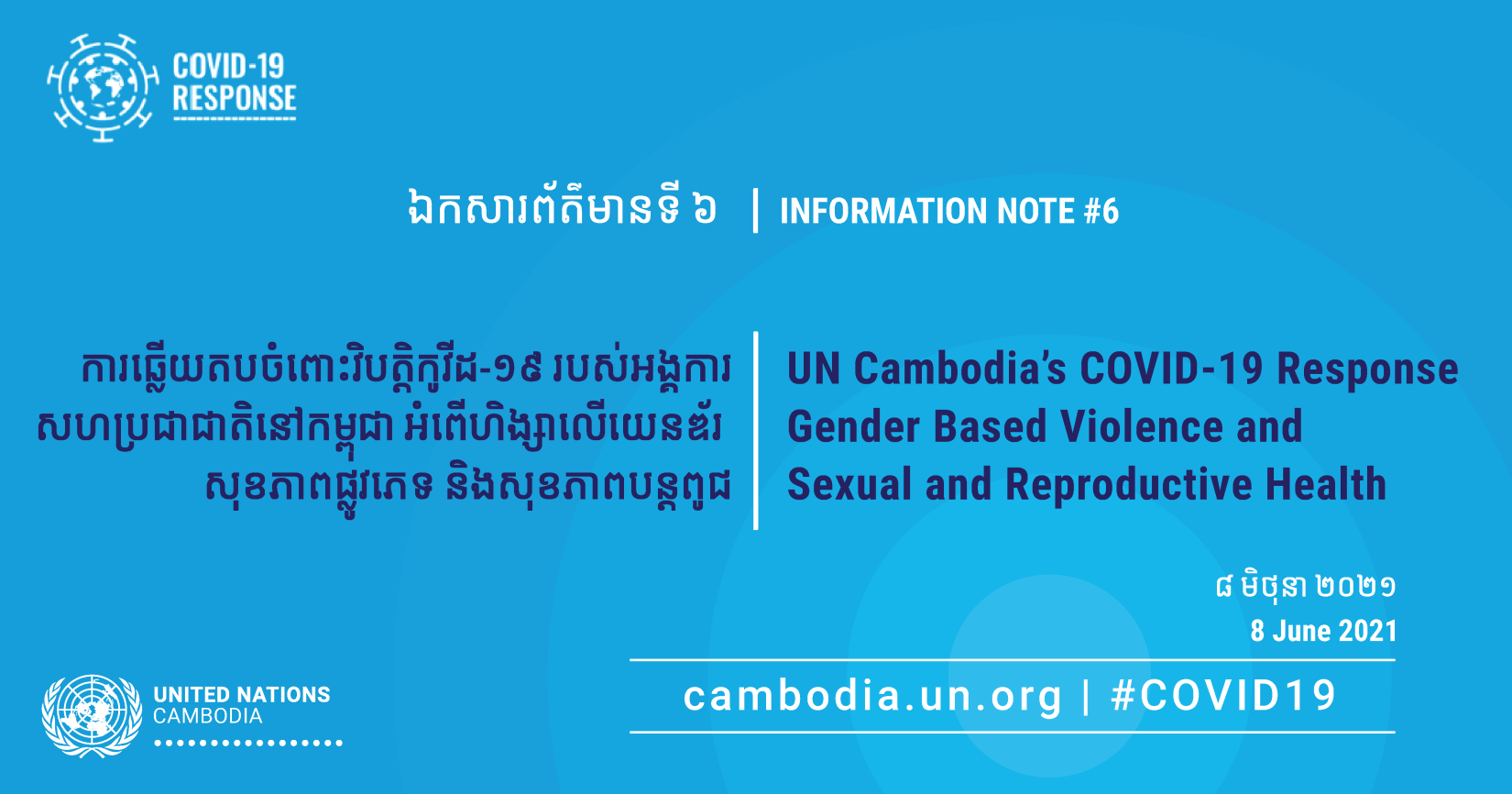Information Note #6: UN Cambodia’s COVID-19 Response Gender Based Violence and Sexual and Reproductive Health
08 June 2021

Violence against women and girls, and particularly domestic violence, has dramatically escalated around the world in the context of the COVID-19 pandemic. As many countries went into lockdown, access to services and justice for survivors of violence, as well as prevention efforts, were severely curtailed. Recent global estimates indicate that for every 3 months the lockdown continues, an additional 15 million women are expected to be affected by violence.[1] In April 2020, the UN Secretary-General urged all governments to make the prevention and redress of violence against women and girls a key part of their national response plans for COVID-19.
Violence against women is one of the most pervasive human rights violations worldwide and has enormous costs for women’s health, safety and well-being. In Cambodia, an estimated one in five women report having experienced physical and/or sexual violence by an intimate partner in their lifetime.[2] One in two children have experienced severe beatings, one in four children have experienced emotional abuse, and one in twenty girls and boys have been sexually assaulted.[3]
Violence against women and girls brings huge economic costs to any society. It impacts negatively on women’s participation in education, employment and civic life and undermines poverty reduction. It results in lost employment and productivity, and it drains resources from social services, the justice system, health-care agencies and employers. As such, violence against women is a clear barrier to sustainable development and achievement of the Cambodia Sustainable Development Goals.
The United Nations supports prevention of Gender-Based Violence (GBV) and increased access to essential services for women and girls in Cambodia. For the COVID-19 pandemic, the United Nations prioritised support to the Ministry of Women’s Affairs (MoWA) and CSO service providers to ensure that essential services for Violence against Women/Gender Based Violence (VAW/GBV) survivors remain coordinated, accessible and functioning, using on-line modalities when possible, and information about service availability is disseminated, especially to those most likely to be left behind.
United Nations assistance also included support to health and social services for continued care to gender based violence survivors, such as (i) Equipping service providers in Phnom Penh and eleven provinces with knowledge and skills on gender responsive essential services, including case management, online counselling and basic counselling skills for GBV survivors; (ii) Update and dissemination of a service directory for GBV survivors; (iii) Education to prevent and respond to VAW during the pandemic through social media, reaching 360,056 people; and (iv) Assistance in developing guidelines for women and children’s safety in state quarantine.
Since the start of the pandemic there has been an increase in the number of calls to helplines and hotlines in Cambodia[4], particularly seeking support for COVID-19 related concerns, mental health, lack of food and safety. The United Nations is directly assisting these helplines/hotlines and has supported the development of Guidance for provision of services via helplines. The United Nations is also working to strengthen the capacity to respond to the protection needs and facilitate referrals to necessary services.
The United Nations continued support to the most vulnerable through strengthening 15 community-based women led networkers to conduct peer to peer psycho-social support for returning women migrant workers in quarantine facilities and for their integration into the community. Approximately 2100 dignity kits were delivered to vulnerable female migrant returnees and women and girls at risk of GBV in 8 provinces. Interventions have also focused on the protection of children of migrants who returned to Cambodia from Thailand in 2020 due to the closure of borders. As a result, almost 80,000 children, parents and caregivers were reached with awareness raising activities and mental health and psychosocial support (MHPSS), and about 500 service providers have enhanced capacity to provide MHPSS and on Gender-Based Violence (GBV) risk mitigation.
To protect children, newly adapted case management guidelines during COVID-19 and instructions for the safety of children in residential care were adopted and 583 social service workers were trained on its implementation, with the assistance of the United Nations. As a result, at least 12,743 children (5,639 females) since 2020 who experienced violence were provided with social, health and justice services.
Sexual and Reproductive Health and Rights
In close collaboration with the National Maternal and Child Health Centre (NMCHC) of the Ministry of Health, the United Nations in Cambodia supported the development of National Guidelines on ensuring the continuity of essential Sexual Reproductive Maternal and Newborn health (SRMNH) services during the COVID-19 pandemic in April 2020. With the continued implementation of these important guidelines and timely programme adjustment, SRMNH services remain functioning and available to women and girls. The United Nations and the National Maternal and Child Health Centre keep monitoring the continuity of essential SRMH services across the country and the accessibility to these services, particularly by vulnerable populations. In 2020:
- Two out of three rounds of an internal rapid assessment on access to SRMH and GBV services during the COVID-19 have been conducted in early and late May 2021 respectively. The last round will be undertaken in July 2021. Social media communication is being developed to address the issues found by the assessment.
- 120,448 children under 5 and 361,000 pregnant women benefitted from essential services integrating COVID-19 precautionary measures in the north-eastern provinces of Cambodia.
- 8,543 parents/caregivers (5,055 female) were provided with maternal care, Gender Based Violence information and psychological support.
- 83,054 young people (55,016 females) reported using the adolescent youth friendly health services in eight priority provinces.
In order to make the prevention and redress of violence against women and girls a key part of the national response to COVID-19, the United Nations continues to advocate with the Royal Government to protect and promote the rights of women and girls including (i) to prioritize funding for essential services and to increase flexible funding for women’s organizations; (ii) to prevent violence against women and girls through national zero tolerance policies and social mobilization campaigns; (iii) to adapt services to the COVID-19 context; (iv) to amend the legal framework to ensure its compliance with international human rights norms and standards, including the Convention on the Elimination of All Forms of Discrimination against Women, and (v) to collect data for the improvement of GBV services and programmes.
###
UN Cambodia’s Response to COVID-19 Information Notes are official documents from the United Nations in Cambodia intended for the media and other partners. They are prepared by the Office of the UN Resident Coordinator.
[1] UNFPA, “Impact of the COVID-19 Pandemic on Family Planning and Ending Gender-based Violence, Female Genital Mutilation and Child Marriage”, Technical Note, 27 April 2020
[2] Cambodia Demographic and Health Survey (CDHS) 2014
[3] The 2013 Cambodian Violence Against Children Survey (CVACS)
[4] Reports received from the main toll-free helpline managed by Child Helpline Cambodia (CHC) show that Pre COVID-19 lock down, CHC received around 2600 calls per month. During COVID-19 lock down, the calls increased from 2600 calls per month to 4,100 calls per month.





